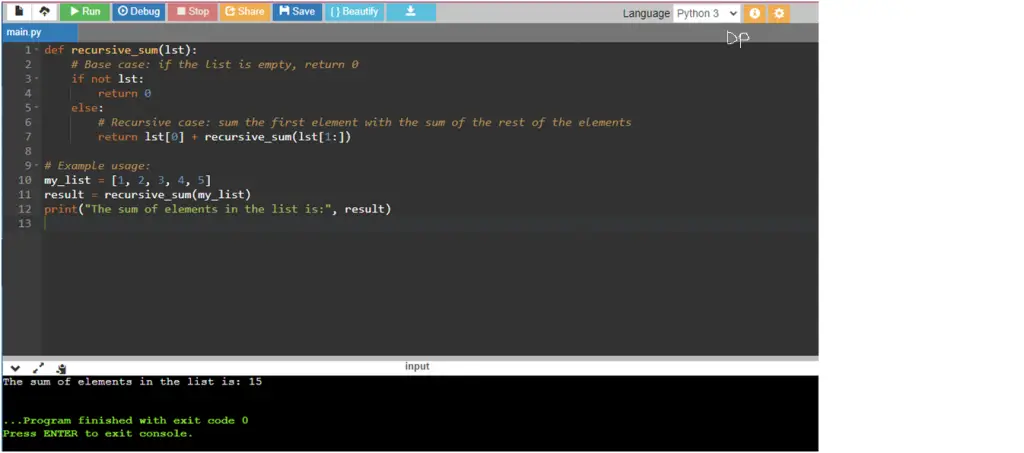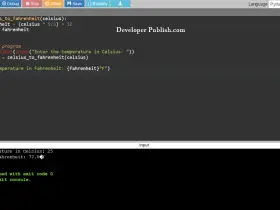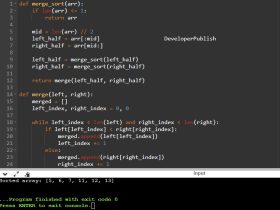Python Program to Find the Sum of Elements in a List using Recursion
This Python program finds the sum of elements in a list using recursion.
Recursion is a programming technique where a function calls itself in order to solve a problem. To find the sum of elements in a list using recursion, we can break down the problem into smaller parts.
Problem statement
You are given a list of integers. Write a Python program to calculate the sum of all the elements in the list using recursion.
Python Program to Find the Sum of Elements in a List using Recursion
def recursive_sum(lst):
# Base case: if the list is empty, return 0
if not lst:
return 0
else:
# Recursive case: sum the first element with the sum of the rest of the elements
return lst[0] + recursive_sum(lst[1:])
# Example usage:
my_list = [1, 2, 3, 4, 5]
result = recursive_sum(my_list)
print("The sum of elements in the list is:", result)
How it works
To understand how the Python program to find the sum of elements in a list using recursion works, let’s break down the code step by step:
def recursive_sum(lst):
# Base case: if the list is empty, return 0
if not lst:
return 0
else:
# Recursive case: sum the first element with the sum of the rest of the elements
return lst[0] + recursive_sum(lst[1:])
- Function Definition: We define a function called
recursive_sumthat takes a single argument,lst, which is the list of integers we want to find the sum of. - Base Case: The function starts with a base case check:
if not lst:
return 0
- If the input list
lstis empty (i.e., its length is 0), the function returns 0 immediately. This is the termination condition for the recursion. When we reach an empty list, we know there are no elements left to sum, so we return 0. - Recursive Case: If the input list
lstis not empty, we enter the else block:
return lst[0] + recursive_sum(lst[1:])
lst[0]represents the first element of the list. We add this element to the result.recursive_sum(lst[1:])is where the magic of recursion happens. We call therecursive_sumfunction again with the remaining part of the list, which is all elements except the first one (lst[1:]).
Here’s a visualization of how the program works for the example my_list = [1, 2, 3, 4, 5]:
- First Call:
recursive_sum([1, 2, 3, 4, 5])returns1 + recursive_sum([2, 3, 4, 5]) - Second Call:
recursive_sum([2, 3, 4, 5])returns2 + recursive_sum([3, 4, 5]) - Third Call:
recursive_sum([3, 4, 5])returns3 + recursive_sum([4, 5]) - Fourth Call:
recursive_sum([4, 5])returns4 + recursive_sum([5]) - Fifth Call:
recursive_sum([5])returns5 + recursive_sum([])
Now, the base case is reached with an empty list [], so it returns 0.
The results are propagated back up the recursion stack, and the final result is calculated as follows:
1 + (2 + (3 + (4 + (5 + 0))))
1 + (2 + (3 + (4 + 5)))
1 + (2 + (3 + 9))
1 + (2 + 12)
1 + 14
15
So, the sum of elements in the list [1, 2, 3, 4, 5] is indeed 15, as calculated by the recursive function.
Input/Output





Leave a Review